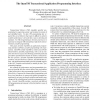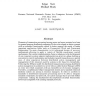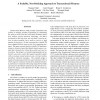186 search results - page 25 / 38 » Transactional Mutex Locks |
IEEEPACT
2007
IEEE
14 years 5 months ago
2007
IEEE
Transactional Memory (TM) simplifies parallel programming by supporting atomic and isolated execution of user-identified tasks. To date, TM programming has required the use of l...
HPTS
1993
14 years 3 months ago
1993
Elements of transaction processing become more and more accepted as a base for general purpose distributed computing.We have developed an action concept with an extended functiona...
TKDE
2002
13 years 10 months ago
2002
As technological advances are made in software and hardware, the feasibility of accessing information "any time, anywhere" is becoming a reality. Furthermore, the diversi...
XSYM
2007
Springer
14 years 5 months ago
2007
Springer
Nowadays, concurrency control for XML data is a big research problem. There are a number of researchers working on this problem, but most of the proposed methods are based on the ...
HPCA
2007
IEEE
14 years 11 months ago
2007
IEEE
Transactional Memory (TM) provides mechanisms that promise to simplify parallel programming by eliminating the need for locks and their associated problems (deadlock, livelock, pr...



